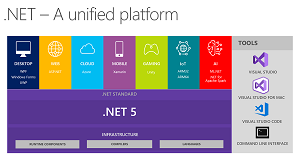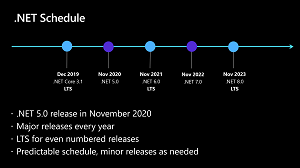News
Microsoft Says .NET 5 Replaces .NET Standard (Except for ...)
Does .NET 5 replace .NET Standard? Well, for the most part, says Microsoft's Immo Landwerth, who penned a blog post to answer developer questions about the future of .NET Standard.
He said .NET 5 improves code sharing and replaces .NET Standard except for cases where developers need to extend the reach of their code sharing to support older frameworks such as .NET Framework or share code between specific existing frameworks.
 [Click on image for larger view.] The .NET Journey (source: Microsoft).
[Click on image for larger view.] The .NET Journey (source: Microsoft).
Looking ahead, developers should focus on .NET 5, which has an official target framework name (TFM) -- used in project files and NuGet packages -- of net5.0.
In summary, Landwerth said developers should :
- Use
netstandard2.0 to share code between .NET Framework and all other platforms.
- Use
netstandard2.1 to share code between Mono, Xamarin and .NET Core 3.x.
- Use
net5.0 for code sharing moving forward.
.NET Standard, to recap, is a formal specification of .NET APIs that are intended to be available on all .NET implementations. Or, as Landwerth said in 2016, ".NET Standard solves the code sharing problem for .NET developers across all platforms by bringing all the APIs that you expect and love across the environments that you need: desktop applications, mobile apps & games, and cloud services."
It was used along with the new open source, cross-platform evolution of the proprietary, Windows-only .NET Framework: .NET Core.
.NET Core, of course, is further evolving into the unifying .NET 5, which will debut in its final form next month, having just been released in a go live, production-ready Release Candidate 1 this week (one more RC will follow).
 [Click on image for larger view.] .NET 5 (source: Microsoft).
[Click on image for larger view.] .NET 5 (source: Microsoft).
Landwerth, in a Sept. 15 blog post, said, ".NET 5 will be a single product with a uniform set of capabilities and APIs that can be used for Windows desktop apps, cross-platform mobile apps, console apps, cloud services, and websites"
He further discussed how .NET 5 can be seen as the combination of .NET Standard and .NET Core.
While .NET Standard was previously described as solving code-sharing problems for .NET developers, Landwerth pointed out problems with that scheme, such as:
- .NET Standard versions slowly: For various technical reasons, ".NET Standard can't ship very frequently. So, if a feature misses a particular release, you might have to wait for a couple of years before it's even available and potentially even longer until this version of .NET Standard is widely supported."
- .NET Standard needs a decoder ring: This is a complicated issue about mapping .NET Standard versions to their implementations.
- .NET Standard exposes platform-specific APIs: Even though these will be avoided in
net5.0 and future versions, Landwerth said, "it's impossible for us to predict the future. For example, with Blazor WebAssembly we have recently added a new environment where .NET runs and some of the otherwise cross-platform APIs (such as threading or process control) can't be supported in the browser's sandbox."
 [Click on image for larger view.] The .NET Schedule (source: Microsoft).
[Click on image for larger view.] The .NET Schedule (source: Microsoft).
In conclusion, Landwerth said, "While .NET Standard 2.1 will be the last version of .NET Standard, .NET 5 and all future versions will continue to support .NET Standard 2.1 and earlier. You should think of net5.0 (and future versions) as the foundation for sharing code moving forward."
About the Author
David Ramel is an editor and writer at Converge 360.